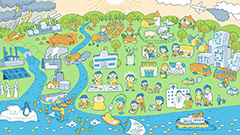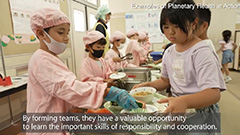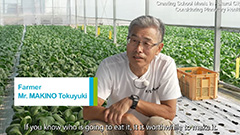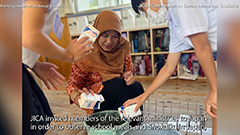The concept of Planetary Health needed today

Planetary Health is the concept of the inter-relationship between 'health of the planet' and 'health of human beings’
The food system begins with production, goes through a very long journey such as processing, transportation, and cooking, and eventually results in our pleasure and gratitude through food. Accumulation of daily diet affects nutritional status and health condition.
Currently, food crisis occurs due to floods and drought caused by climate change. Meanwhile, in the area where food delivery is restricted, the increased risk of over nutrition and associated complications due to the intake of processed foods and high-calorie foods is revealed.
Moreover, around 30% of greenhouse gases are attributable to the food system and it indicates that climate change is tied closely to our eating habits.
We created the JICA-Net multimedia-based material, “School Meals and Shokuiku in Japan through the lens of Planetary Health”, for the purpose of considering how we address child nutrition, leveraging the effort of School Meals and Shokuiku from the perspective of Planetary Health that is the concept of the inter-relationship between 'health of the planet' and 'health of human beings’.
“Japan’s most forward-looking School Meals” in Fukuroi City, Shizuoka Prefecture
Looking back on the long history of School Meals in Japan, this video explains the flow of an environmentally-friendly practice from food production to utilization of meal leftovers through the example of School Meals and Shokuiku in Fukuroi City, Shizuoka Prefecture.
A system of circularity is implemented within School Meals, which might be a form of forward-looking School Meals. In this sense, School Meals provided in Fukuroi City would exactly be “Japan’s most forward-looking School Meals”.
The characteristic of this video is to teach how School Meals are performed, how the promotion of Shokuiku is applied at elementary schools to encourage children’s dietary habits, and how people are involved in School Meals and Shokuiku.
Moreover, Professor HASHIZUME Masahiro of the Graduate School of Medicine at the University of Tokyo, and Professor and Health Researcher KASUGA Fumiko of the Interfaculty Initiative in Planetary Health at Nagasaki University explain the role of School Meals and Shokuiku, focusing on Planetary Health from an academic standpoint, which helps people who are not yet familiar with ‘Planetary Health’ understand what the term means.

For Shokuiku, it is important that students prepare and serve school meals themselves
The material that conveys key points for establishing a better School Meals system

Fukuroi City school meals promote the concept of “local production for local consumption,” using vegetables purchased from local farmers
Nowadays, various videos about Japan’s School Meals are being watched and are attracting people’s attention worldwide. Most of these materials generally introduce the situation of children serving and cleaning up, as well as the situation of School Meals center, however, the vision is also mentioned through the voice from the municipality alongside the School Meals system. Several key messages to “make better School Meals System” are covered in the comments from ISHIZUKA Koji, chief of the Delicious School Lunch Division in Fukuroi City, Municipal Board of Education in Shizuoka Prefecture: considering School Meals carefully to “improve children’s sense of taste”, the effort of reducing salt, data assessment, the effort to reduce leftovers, the way to involve farmers, and functional school meals center to respond against natural disasters.
For that reason, we think that the video would convey a new viewpoint to various countries that are planning to develop School Meals and Shokuiku.
There were much more useful contents, such as Shokuiku performed by the nutrition teacher and the experiences among farmers. Inevitably, those were left out because of the total length of this video.
Utilizing for training and events
We hope that all people involved in School Meals and Shokuiku will have a chance to watch the video, including participants in JICA training programs, JICA experts and counterparts, private companies and educational institutions.
We intend to use the video at JICA’s programs (Human Development Department and Economic Development Department) in the field of nutrition-related School Meals and Shokuiku and capacity development training, “Human development to solve nutrition issues through the life-course approach”.
This video was already shared in “2024 Global Child Nutrition Forum” and we plan to use it at the “Nutrition 4 Growth Paris 2025”, in March 2025. It is also supposed to be utilized at several conferences and events further. Recently, we also received a request from one of the newspaper companies to highlight the efforts of Fukuroi City.
School Meals and Shokuiku as an approach to solving nutritional issues
“Improving Nutrition” is one of the JICA Global Agenda. This fiscal year, JICA made the Cluster Strategy “Improving Nutrition Through the Life-course”, and ‘School Meals and Shokuiku’ is one of the focused approaches.
We leverage the over 100-year history of Japan’s School Meals and maximize the opportunity of School Meals as a part of Shokuiku, which will be considered “a practical material”.
Japan’s School Meals and Shokuiku well represent the practice of human resource development involving the planet, society, community, and our bodies through meals.
Based on the importance of a multi-sectoral and multi-stakeholder approach, sharing examples of Japan’s efforts of School Meals and Shokuiku and JICA’s cooperation would become a hint for considering cooperation in nutrition. We hope that the video will be useful to everyone when thinking about the way of addressing nutrition issues.

The material introduces the examples of JICA’s cooperation on School Meals and Shokuiku.
※The following is about a report of the complex crises, including climate change, and the increasing complexity of nutrition challenges. Please refer to it as well.
‘Human Security, Politics and Society under Compounded Crises’—the Second Issue of the JICA Ogata Research Institute Report ‘Human Security Today’
[Paper] Responding to Increasingly Complex Nutrition Issues by Implementing Multi-sector/Multi-stakeholder Approaches
(JICA Ogata Sadako Research Institute for Peace and Development, Visiting Fellow, NOMURA Marika/Principal Research Fellow, MAKIMOTO Saede)
https://www.jica.go.jp/english/jica_ri/publication/booksandreports/20240801_01.html
UJIIE Miho
JICA Human Development Department
*The Material(s) mainly applied
School Meals and Shokuiku in Japan through the lens of Planetary Health
In recent years, due to the extreme heat caused by global warming, the price of vegetables has been rising, and as a result, it has become evident that our diet is closely connected to climate change. It is also said that around 30% of greenhouse gases are caused by the food system. In this way, in the context of climate change, the concept of 'Planetary Health' refers to the inter-relationship between 'health of the planet' and 'health of human beings’ and trying to solve this problem in a practical way.
School meals and Shokuiku (Food and nutrition education) can be said to be a tangible example of 'Planetary Health'. By bringing the local communities together, including local government, nutrition professionals, cooks, schools, farmers and children, community-based delicious school meals can be realized, and as a result, this can be not only an 'adaptation measure' but also a 'mitigation measure' for climate change.
In this video, through the example of Fukuroi City in Shizuoka Prefecture and commentary from experts, Japan's school meals and Shokuiku, particularly from the perspective of climate change, are explained in 22 minutes, covering their characteristics and key points. We hope that people in countries that are introducing or improving school meals will find this video useful.
作成:JICA Health Group 2, Human Development Department
監修:NOMURA Marika, Senior Advisor, JICA Human Development Department
出演: HASHIZUME Masahiro, Professor, Graduate School of Medicine, The University of Tokyo
KASUGA Fumiko, Professor, Health Researcher, Interfaculty Initiative in Planetary Health, Nagasaki University
ISHIZUKA Koji, Chief, Delicious School Lunch Division, Fukuroi Municipal Board of Education, Shizuoka Prefecture




scroll